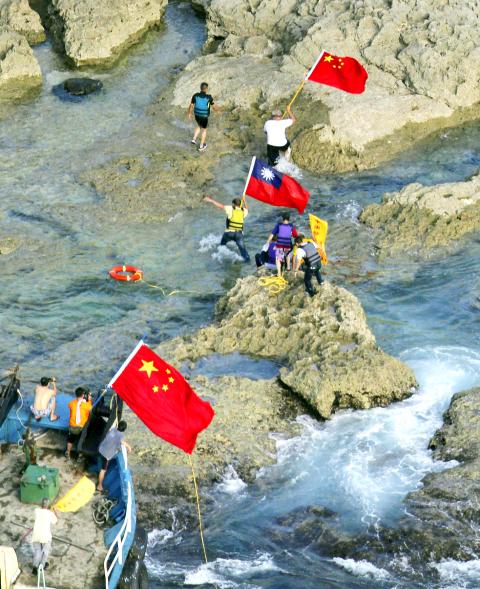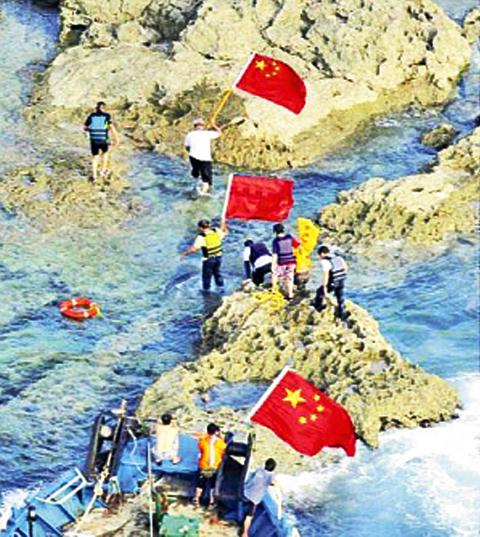China uses several strategies in its state-controlled media to blot out Taiwan from reality, even though Taiwan is real and here to stay.
In addition to the recent episode across the Strait where the Xiamen Business Newspaper photoshopped a Republic of China (ROC) flag out of a photograph showing Chinese nationals landing in the disputed Diaoyutai Islands (釣魚台) — while leaving the People’s Republic of China (PRC) national flags intact — Beijing propaganda officials also use a Western punctuation device (so-called “scare-quotes”) to blot out Taiwan’s dignity and geopolitical space.
The use of scare quotes has a long history in the West, where the term was first coined in the early 1900s and used by academics as a punctuation tool while doing textual analysis. Basically, scare quotes are words or phrases put inside quotation marks — double quote marks in the US and single quote marks in the UK — to put some distance between the word or phrase and the writer.

Photo: AFP
Scare quotes were originally used as a distancing tool, but the tool is now so ubiquitous and embedded in the English-speaking countries that it threatens to become a “punctuation epidemic’’ in news articles, blog posts and BBC headlines.
In Chinese print media, these are not “quotation marks’’ but “double bracket marks’’ that signal to the average reader that the words inside the brackets stand for something else that the Chinese Communist Party dare not mention: the reality of Taiwan as an independent, sovereign nation with its own president, premier, currency and legislature.
I only became aware of China’s use of Western-style scare quotes to sort of “photoshop’’ Taiwan out of existence after the Central News Agency reported on how the Xiamen Business Newspaper apologized in a post on Sina Weibo — China’s Twitter-like microblogging platform — “for having inappropriately photoshopped the flag, thereby hurting the feelings of its readers.’’

Photo: CNA
In the original CNA Chinese-language report from Taipei, it was noted that Chinese netizens use the initialism of “PS” to stand for the act photoshopping photos. The same story noted that ‘’another Sina Weibo user suggested online that the Chinese news media should also stop using double quotation marks when referring to the titles of Taiwanese public agencies or senior officials such as the Executive Yuan, the Control Yuan, the premier and the president.”
This very self-aware and savvy netizen in China added to his initial Sina Weibo post: “Adding quotation marks around those titles is a form of blotting-out, since those public institutions and official titles [in Taiwan] genuinely exist.”
And the term he used in the Chinese-language post for “blotting out” was “PS,” meaning that in his mind, and probably the minds of many other Chinese netizens, there is little difference between photoshopping [digitally altering] a photo and “photoshopping” text. By using the initialism “PS’’ in his note about blotting out Taiwan’s reality, he was signaling to other readers in China and around the world that Beijing is fooling no one by its use of Chinese scare quotes in Chinese-language news articles about Taiwan, Tibet, the Dalai Llama and other verboten subjects.
Another way to more liberally and better translate the Sina Weibo poster’s words might be like this: “Friends have suggested to me that when the Chinese media write about Taiwan news, responsible reporters and editors should not put words like President, President of the Executive Yuan and other names related to Taiwan in double quotation marks because this is another form of PS. Those titles and departments in Taiwan really exist! When the Chinese media use double brackets to PS Taiwan’s reality out of the news, we netizens know exactly what is going on and you are fooling only yourselves, Beijing!”
Nick Cohen, a British reporter and blogger for the Guardian in London, told the Taipei Times via Twitter: “[Writers] can use scare quotes to indicate satirical disapproval or disagreement. But you shouldn’t throw them around.”
Taiwan, China and Japan, among other nations in Asia, do not have a word for “scare quotes” in either Chinese or Japanese. They are just called “quotes’’ [引號, yinhao] in Taiwan.
When asked, Sveta Lin (林素純), a doctoral student in philosophy at Chiayi’s National Chung Cheng University, said she had never heard of the Western term before. Is there a word for it in Chinese? “I had never heard of the term ‘scare quotes’ until you asked me. But after checking a dictionary, I now understand its meaning. Here in Taiwan, there is no special Chinese word for scare quotes. We just call such writing tools yinhao [quotes] to mean a general quotation or what you in the West now call a scare quote.”
In English-speaking nations, scare quotes are used by those on the right and those on the left to denigrate and criticize ideas and people on the other side of the political aisle. US President Barack Obama’s election campaign team, for example, uses scare quotes to mock Republican opponent Mitt Romney’s ideas and policies. Romney’s team, for its part, uses scare quotes to criticize and denigrate Obama’s policies, putting words like “Obamacare” and “gay marriage” in scare quotes.
To see how China is now using its own version of scare quotes to denigrate the status of the nation and elected leaders of Taiwan, as evidenced by the Sina Weibo post above about using double bracket quotes when referring to Taiwan or President Ma Ying-jeou (馬英九) or the legislature, is both shocking and revealing.
It’s shocking because it shows just how low China is willing to go to debase its own humanity through arrogance and hubris. And it’s revealing because it shows how scare quotes are now being used in an Asian dictatorship as another Orwellian device to control its population through propaganda and mind control.
“PS’’ (scare quotes intended): It won’t work, Beijing. Even your own citizens see the games you play with double brackets.

April 14 to April 20 In March 1947, Sising Katadrepan urged the government to drop the “high mountain people” (高山族) designation for Indigenous Taiwanese and refer to them as “Taiwan people” (台灣族). He considered the term derogatory, arguing that it made them sound like animals. The Taiwan Provincial Government agreed to stop using the term, stating that Indigenous Taiwanese suffered all sorts of discrimination and oppression under the Japanese and were forced to live in the mountains as outsiders to society. Now, under the new regime, they would be seen as equals, thus they should be henceforth

Last week, the the National Immigration Agency (NIA) told the legislature that more than 10,000 naturalized Taiwanese citizens from the People’s Republic of China (PRC) risked having their citizenship revoked if they failed to provide proof that they had renounced their Chinese household registration within the next three months. Renunciation is required under the Act Governing Relations Between the People of the Taiwan Area and the Mainland Area (臺灣地區與大陸地區人民關係條例), as amended in 2004, though it was only a legal requirement after 2000. Prior to that, it had been only an administrative requirement since the Nationality Act (國籍法) was established in

With over 100 works on display, this is Louise Bourgeois’ first solo show in Taiwan. Visitors are invited to traverse her world of love and hate, vengeance and acceptance, trauma and reconciliation. Dominating the entrance, the nine-foot-tall Crouching Spider (2003) greets visitors. The creature looms behind the glass facade, symbolic protector and gatekeeper to the intimate journey ahead. Bourgeois, best known for her giant spider sculptures, is one of the most influential artist of the twentieth century. Blending vulnerability and defiance through themes of sexuality, trauma and identity, her work reshaped the landscape of contemporary art with fearless honesty. “People are influenced by

The remains of this Japanese-era trail designed to protect the camphor industry make for a scenic day-hike, a fascinating overnight hike or a challenging multi-day adventure Maolin District (茂林) in Kaohsiung is well known for beautiful roadside scenery, waterfalls, the annual butterfly migration and indigenous culture. A lesser known but worthwhile destination here lies along the very top of the valley: the Liugui Security Path (六龜警備道). This relic of the Japanese era once isolated the Maolin valley from the outside world but now serves to draw tourists in. The path originally ran for about 50km, but not all of this trail is still easily walkable. The nicest section for a simple day hike is the heavily trafficked southern section above Maolin and Wanshan (萬山) villages. Remains of